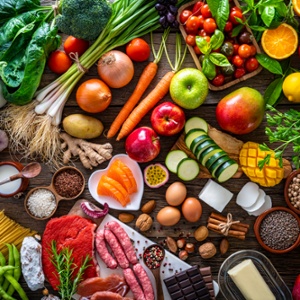For you, making small changes to your diet may be an important part of managing your health and weight.
Healthier eating doesn’t mean swapping all the meals you usually cook and enjoy for different ones. There are many ways you can make your favourite recipes healthier, with small changes that suit you.
You don’t need to make all the changes at once. You could try one or two things to start with and build on them with new changes at your own pace over time.
Making everyday meals healthier
You might find it helpful to think about your usual meals and the portions you usually have on your plate. Is it balanced, or do you think you could make some changes for a healthier combination?
Here are some other changes you could make too.
Try wholegrain varieties
Wholegrain bread, roti, chapatti, pasta, rice and breakfast cereals have more fibre and nutrients than white versions and can also fill you up for longer.
If you are not used to wholegrain versions, try half and half to start with, such as 50:50 bread.
Try tomato-based sauces
Tomato-based sauces can be lower in calories than cheese and cream-based sauces.
Swap to leaner cuts of meat
Choosing a different cut of meat or cutting off the fat when cooking can make your meals healthier.
Type |
Swap |
Try |
|---|---|---|
|
Pork
|
Cooked pork belly joint with fat.
|
Cooked lean pork leg joint without fat.
|
|
Beef
|
Beef steak or diced beef with fat.
|
Lean steak or lean diced beef without fat.
|
|
20% fat beef mince.
Meatballs.
|
Less than 12% fat beef mince.
Lean meatballs.
|
|
|
Lamb
|
20% fat lamb mince.
|
10% fat lamb mince.
|
|
Poultry
|
Chicken breast or thighs with skin.
|
Chicken breast or thighs without skin.
|
Swap some meat in your meals for beans or lentils
Beans, pulses, soybeans, soya chunks and lentils or dhal are lower in fat and higher in fibre than meat.
Add more vegetables to your meals
Try adding more vegetables and less meat or carbohydrates. You could use up any vegetables you have at home by adding to your go-to recipes such as stews, curries, casseroles and stir-frys.
Cooking methods
Instead of frying, try grilling or baking if you can. If you microwave part or all of your meals, try draining off the fat after cooking.
Switching from butter, lard or ghee to vegetable, olive or spray oil and using only a small amount when cooking can make your meals healthier without taking away the taste you enjoy.
Think about a meal you make regularly and write down the possible changes you could make.
Improving cookery skills
The following courses may be helpful for further support to improve your cooking skills or increase your confidence in cooking at home.
Nutrition Skills for life offers fun and informal food and nutrition courses for community members across Wales. Find your local course here.
Other online courses or local adult learning courses may be available to you. Have a search to see what might be right for you.






